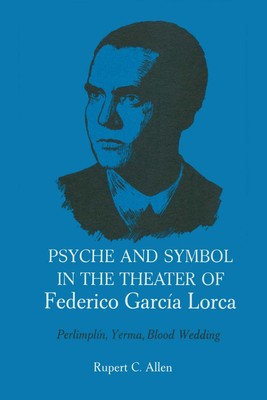
- We will send in 10–14 business days.
- Author: Rupert C Allen
- Publisher: University of Texas Press
- ISBN-10: 029273977X
- ISBN-13: 9780292739772
- Format: 15.2 x 22.9 x 1.4 cm, softcover
- Language: English
- SAVE -10% with code: EXTRA
Psyche and Symbol in the Theater of Federico Garcia Lorca (e-book) (used book) | bookbook.eu
Reviews
Description
Symbol and psyche are twin concepts in contemporary symbological studies, where the symbol is considered to be a statement by the psyche. The psyche is a manifold of conscious and unconscious contents, and the symbol is their mediator. Because Lorca's dramatic characters are psychic entities made up of both conscious and unconscious elements, they unfold, grow, and meet their fate in a dense realm of shifting symbols. In Psyche and Symbol in the Theater of Federico GarcÃa Lorca, Rupert Allen analyzes symbologically three dramatic works of Lorca. He has found PerlimplÃn to be a good deal more complex in both psyche and symbol than it has been admitted to be. Yerma involves psychological complications that have not been considered in the light of modern critical analysis, and the symbolic reaches of Blood Wedding have until this book remained largely unexplored. Lorca was no stranger to the agony of creation, and this struggle sometimes appears symbolically in the form of his dramatic characters. Both Yerma and Blood Wedding reflect specific problems underlying the creative act, for they are translations into the realm of sexuality of the creative turmoil experienced by Lorca the poet. PerlimplÃn portrays the paradoxical suicide as a self-murder born out of the futile attempt to create not a poem, but a self. Previous criticism of these three plays has been dominated by critical assumptions that are transcended by Lorca's own twentieth-century mentality. Allen's analysis provides a new view of Lorca as a dramatist and presents new material to students of symbology.
EXTRA 10 % discount with code: EXTRA
The promotion ends in 8d.23:30:49
The discount code is valid when purchasing from 10 €. Discounts do not stack.
- Author: Rupert C Allen
- Publisher: University of Texas Press
- ISBN-10: 029273977X
- ISBN-13: 9780292739772
- Format: 15.2 x 22.9 x 1.4 cm, softcover
- Language: English English
Symbol and psyche are twin concepts in contemporary symbological studies, where the symbol is considered to be a statement by the psyche. The psyche is a manifold of conscious and unconscious contents, and the symbol is their mediator. Because Lorca's dramatic characters are psychic entities made up of both conscious and unconscious elements, they unfold, grow, and meet their fate in a dense realm of shifting symbols. In Psyche and Symbol in the Theater of Federico GarcÃa Lorca, Rupert Allen analyzes symbologically three dramatic works of Lorca. He has found PerlimplÃn to be a good deal more complex in both psyche and symbol than it has been admitted to be. Yerma involves psychological complications that have not been considered in the light of modern critical analysis, and the symbolic reaches of Blood Wedding have until this book remained largely unexplored. Lorca was no stranger to the agony of creation, and this struggle sometimes appears symbolically in the form of his dramatic characters. Both Yerma and Blood Wedding reflect specific problems underlying the creative act, for they are translations into the realm of sexuality of the creative turmoil experienced by Lorca the poet. PerlimplÃn portrays the paradoxical suicide as a self-murder born out of the futile attempt to create not a poem, but a self. Previous criticism of these three plays has been dominated by critical assumptions that are transcended by Lorca's own twentieth-century mentality. Allen's analysis provides a new view of Lorca as a dramatist and presents new material to students of symbology.


Reviews